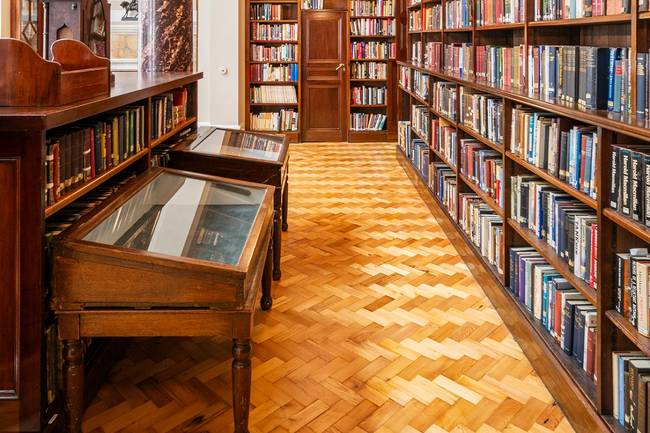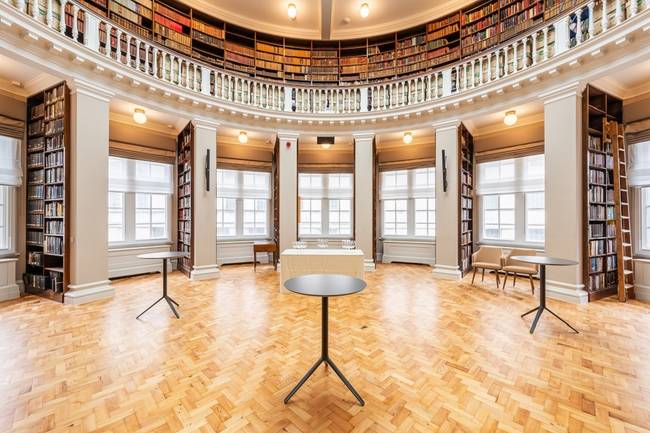RUSI Library
The RUSI Library of Military History is a significant collection dedicated to developing our knowledge of conflict, war and military thinking.
Visiting the library
Members of RUSI can make use of the library when it is not being used for events. We will indicate below when the library is available for members to drop in each week. You can contact our Librarian, Amanda Sheppard, to arrange an appointment. To avoid disappointment, it is recommended that you plan your visit well in advance and contact the Librarian for available research dates and times.
To enter the building, please make sure you bring photo ID with you (e.g. passport/drivers’ licence/citizen card) which matches the name registered on your RUSI membership profile.
Next available library drop-in sessions for RUSI Members are listed below. When you arrive at 61 Whitehall, please check in with Reception, where you will need to sign in and show your photo ID.
You will also be asked to leave coats and bags in our cloakroom, although you can take writing materials into the library.
Collections
The Library includes monographs, maps, journals, magazines and more. The collection forms a unique repository of books on military history with a strong emphasis on nineteenth and twentieth century works.
The Library catalogue can be searched online. We are currently working to add all the library, archive, paintings, prints and sculpture collections to the catalogue.
Rare and Special Books
Our Rare Books collection dates from 1700 and consists of of over 600 pre-1821 books and pamphlets and other items of note. The collection includes Lord Radstock's extensive collection of Naval pamphlets donated by his widow Esther Lady Radstock.
The collection includes statutes, history books, engineering and training guides, political and pamphlets. All our Rare Books are fully catalogued and can be available to see on site by appointment.
RUSI Archive & Special Collections
The RUSI Archive consists of documents and manuscripts relating to the creation and running of the Institute which includes council minutes and some membership records.
Our special collections include photographs, cuttings books, diaries and newspapers relating to military events or members of the Institute.
We also have Captain Lionel Challis's 'Peninsular Roll Call' which records the service records of every Army Officer who service in the Peninsular War between 1808 and 1814. A digital version is available for study.
Paintings, Prints and Sculpture
The RUSI building on Whitehall is home to a collection of paintings and sculpture that reflect the history of the institute and military history more widely.

Book loans
Loans are made to RUSI Members for one calendar month and renewals can be made by emailing the library.
Periodicals and references items may not be borrowed. All loans are subject to the discretion of the Librarian.
Copyright and photographing
Adherence to UK copyright law is the responsibility of the researcher and details of copyright can be found on the British Library website
For research, private study, review, criticism, quotation and reporting current events the concept of fair usage allows limited lawful use or reproduction of work without seeking the permission of the copyright holder.
If you are unsure, please check with the Librarian, this includes photography.
Please seek permission from library staff. Any copies made can only be for non-commercial purposes and for private or individual study in compliance with UK copyright law. Any fragile and damaged items should be copied only with the permission of the Librarian. They should be copied one page at a time only and always supported.


Statement on Language in Description
The RUSI Library aims to describe library materials with respect for all who create, use, and are represented in the collections we manage.
However, users may encounter language that they feel to be offensive or harmful, for example, language that is racist, sexist, or homophobic, in catalogue records. These descriptions will reflect language that was used by the people and organisations that created the material. For example, it is standard practice to transcribe book titles and enter them as they are represented in the source material and are included for academic purposes. This can provide information about the people who created it, and, in such cases, the work of library staff is to provide additional context.
It is the library’s current practice to address offensive or harmful language as part of routine description work. We welcome feedback as we recognise that terminology evolves over time and that efforts to create respectful and inclusive descriptions must be ongoing.
Please submit feedback by emailing library@rusi.org. Staff will review the description and, if required, will update it in a way that balances the preservation of original context with an awareness of the effect of language on our users. Revisions may include providing additional context and/or replacing problematic terminology.






